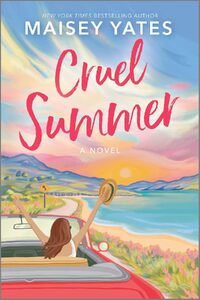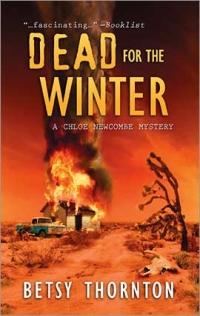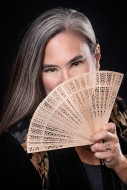 CRUEL SUMMER |
 Fall headfirst into July’s hottest stories—danger, desire, and happily-ever-afters await. |

Purchase
Worldwide Mystery 551 Mystery, Romance Suspense Excerpt of Dead for the Winter by Betsy ThorntonCRAIG TALKED NONSTOP the whole hour and a half from his place in Cochise County, where I'd picked him up, all the way to Tucson International Airport. "I think the main problem is my soul. I mean people like you and me, we don't think of ourselves as religious so we don't use that word too much, you know? Soul. Still, we've got one, I know that, and someone like you, Chloe, a normal person, well, your soul is basically okay, maybe not great all the time, but okay. Mine has been stagnating." I circled the parking lot, looking for a space. They were renovating the airport, and nothing seemed to be in the right place. It was hard to concentrate with Craig talking. "I think the reason I've been feeling so diminished lately," he went on, "is because the soul is spiritual, and I've been treating it with chemicals. Where's that at? Treating the most precious thing we have with chemicals. In a way it's an insult to God — the Life Force, Higher Power, whatever you want to call it." I said warningly, "I hope you brought your prescriptions." Ahead I thought I saw an empty slot, but, damn, there was a motorcycle in it. "You did, didn't you?" "Of course I did," said Craig with mock patience. "Have a little faith, Chloe. Not that they've been that helpful lately. But this South American thing is going to work, I can sense it. I'll be meeting real people, poor people, people living on the edge of life just barely surviving. Have you ever thought about how that would affect you, Chloe? Have you?" "Have I what?" Damn, I'd gone down this row just a moment ago. "Thought about how living on the edge of life would affect you." His voice rose. "I mean, really thought about it." My head felt like it was in a vise. "Not now. Stop, okay? Just for a minute. I'm trying to park and I can't focus." "What do you need to focus for? Either there's a space or there isn't." "So, there isn't." I stopped the car. "Listen, you're going to have to get out here. This is fairly close. The last thing we need is for you to miss your plane." "Okay, okay, okay." He opened the door, reached in the back and pulled out his backpack, all he would need to spend six months with poor people. I leaned over from the driver's seat to kiss him goodbye. Our heads bumped. "Have a wonderful trip," I said. "Wait. I just remembered." "What?" "You said you need a bookcase in your living room. In that funny space where nothing fits." "Craig, go." "I got the name of a carpenter for you. He lives in Prophecy and he's good — more than good. He's an artist really. And he's reasonable too. I wrote it down." He patted his pockets. "Where the hell —" "Don't worry," I said, the anxiety of the punctual gripping my okay soul. "I'll figure something out. You're late. Just go." "Found it!" He smiled happily and thrust a piece of paper at me. It fluttered to the floor. I leaned down and picked it up. "I'm off. Bye," he said. "I'll write when I can. At least a postcard from Manaus, if they have a post office." I watched him walk away, a tall tanned man with a brilliant smile. He'd been my boyfriend for more than a year. I watched until he reached the entrance and vanished inside. Then I put Radiohead in the CD player, The Bends, started up the car again, and drove out of the parking lot. Over Tucson, the autumn sky was a clear luminous blue. There were palm trees everywhere. Ahh. No more Craig for six months. My basically okay soul seemed to slowly expand and drift upward, into that blue friendly sky. I LIVE IN OLD DUDLEY, which used to be the biggest town in Cochise County; a copper-mining town, complete with bars, churches, a big hotel, and even an opera house. The mines went bust some thirty years ago but it's still the county seat. The little wooden mining shacks straggle every which way up the sides of the steep hills, picturesque enough to have attracted a whole new set of people, New Agers: artists, craftspeople and wannabes, massage therapists, aging hippies, retirees, and the certifiably crazy, all living as well as possible on limited funds, trust funds, early retirement funds, and funny money. In no time a funky miner's shack that had once sold for five thousand dollars when the mines closed down went to fifty thousand unrenovated, a hundred thousand or more fixed up. Me, I moved here from New York before the boom because I inherited a house. I work as a victim advocate at the county attorney's office. A couple of weeks after Craig left I called the carpenter he'd recommended. His name was Terry Barnett and he lived in Prophecy, a small settlement fifteen miles away near the San Pedro River. It had taken in the arty, hippie, New Age overflow from Old Dudley when the real estate boom hit. I liked Terry's voice on the phone, relaxed and easygoing, and we made an appointment. About a week later an old red pickup pulled up next to my Geo in the driveway Craig had paved with bricks for me, and parked right on top of the oil spots from Craig's leaky truck. I watched through the kitchen window as a slender man in his forties got out. He had light brown curly hair, longish and thinning a little, gold wire-rimmed glasses. An ordinary-looking man; not tall, not short, wearing jeans and a white T-shirt with a logo so faded you couldn't tell what it was anymore. He was whistling but stopped when I opened the door. "You must be Chloe." He smiled. It wasn't a Craig smile, all fireworks and complicated emotions, but when he smiled he stopped looking ordinary. Behind the wire-rimmed glasses, his green eyes danced with light. "I'm Terry Barnett." His hand came out and I shook it. It was warm and dry. I led him into the living room and showed him the space. It was between two windows, a little too narrow for a standard bookcase. He measured it, then measured it again. "Twice," he said, conversationally. "You always measure twice. I used to measure three times, as a trick, to slow myself down." "It's not good to be fast?" "If you're too fast, you lose your watchfulness." He smiled again. Zing. I felt myself connecting. Fun, fun, fun. I must be desperate. He was the first man who'd been in the house since Craig left. Not that Craig was completely gone, remnants of him were everywhere. The vegetable garden he'd dug outside, his gardening books on the coffee table, along with a book he'd lent me months ago: No Mercy — A Journey to the Heart of the Congo. "Watchfulness," I said. "Aha. A Zen carpenter." "Golly gee." Terry ducked his head boyishly, looking embarrassed. "You're interested in Zen?" There was something really appealing about him, charming. I laughed and kicked at the coffee table Craig had made from old sautillo tile. "My brother's a Buddhist, he even lives in a monastery — Karme Choling, in Vermont." "No kidding." "It really saved him," I said. Terry sat companionably on Craig's favorite chair by one of the windows, not in a hurry about anything, and looked at me with interest. "How's that?" "Oh, he was a wild kid, he went to prison for a year in Michigan, when he was nineteen." I couldn't believe I was telling him this. "Possession of marijuana, Michigan had really tough drug laws. And then…he was different when he got out. Kind of, I don't know — frantically phony? Until the Buddhism." "Prison." Terry's eyes were warm, concerned. "That's really tough. Nineteen years old. The things we do when we're young. We're all casualties of our youth, in some ways." Or just casualties, I thought, thinking of Craig. "You're not from around here, are you?" I said, guiltily changing the subject. "The Midwest." He rolled his eyes. "O-hi-o. Not where you'd want to spend the rest of your life, but it was a great place to be a kid." He pushed his glasses farther up on his nose and added a little wistfully, "You should see it in spring; all those lawns like green velvet, closest thing to paradise." "You miss it." He shook his head. "Can't take the winters. I used to like the cold, I lived in Boulder, Colorado, till seven years ago. My mom got sick. My dad was already dead, so I went back to Ohio and looked after her. It was winter then. Snow falling outside, all day, all night, while I watched her dying." His green eyes dimmed a little. Then he shook his head, almost apologetically. "That was the hardest thing I've ever done. I sat by her bed and we planned her funeral. It kind of kept her going. When we got done with that, we planned mine." "Your funeral?" "Yeah. I've got the plot all bought and paid for. I promised her I'd be buried in the old Presbyterian cemetery right next to her and my dad, so she wouldn't be too lonely." I was impressed. Most men wouldn't have the emotional what? — composure? — to tell a story like that. "I'm sorry," I said. "Anyway, after that I needed to get away from all those winters. So I figured the Southwest. I was in Tucson, twenty years ago, with my brother Fred and I liked it then." "What was in Tucson twenty years ago?" "As it turned out, nothing." He laughed. "We were chasing a phantom." "Like what? A dream of the Wild West?" "She was a dream all right." He made a face. "It's a long story. Talk about being casualties of our youth. I guess it was hearing about your brother, I even mentioned it. I haven't spoken to Fred in years. We're pretty much permanently estranged." I loved both my brothers with a passion, Danny who was still alive, James, who was dead. "That's so sad." For a moment Terry looked off into space, as if remembering. "I don't know, Fred missed the boat somewhere. Sort of weirdly needy, as if nothing was ever enough for him." He shrugged. "Anyway —" He stood up reluctantly. "On to business. You want to paint the bookcase or keep it the natural wood?" "Wood, I think." "Good choice. I've got some samples in the truck," he said, "if you want to come look? I was thinking if you want natural wood we can stain it, cherry would be good. For wood, I think you'll like the maple, not as grainy as oak, more subtle." I followed him out to the old red truck parked on top of Craig's oil stains. Fall had hung on and on this year. It was halfway to December, and still balmy in midafternoon. Orange Mexican sunflowers planted by Craig lined the driveway, watching my every move. I ignored them. Leaves had drifted into the truck bed while we were inside. They lay among some pale wooden boards, a brilliant yellow. "Look at that!" said Terry. His face shone like a kid's with a new computer game and he struck me then as a person infinitely easy to be around. "Beautiful, aren't they." "Yes," I said. He took some of the boards, one-by-fours cut short, out of the truck and showed them to me, his hands caressing the wood, as if each piece were a treasure. "This is the maple. See how fine the grain is?" I touched it. "Yes, I do see. I'll trust your judgment." "Maple then, stained cherry. Well, I guess we're all done." He put the wood back. "I should go." But he stayed, leaning against the truck. That was fine by me. He was the most attractive man I'd met in years. He looked up at the sky. "Nice day." I looked up too. The sun on my eyelashes put halos on everything. "You ever have things you want to forget come back to you," said Terry suddenly. "And then you can't get them out of your head?" I laughed. "All the time." For a moment he paused, our eyes met. Then, "I really have to go," he said. He took out his keys and put his hand on the door handle. "You're so easy to talk to. We should talk some more sometime." "Sure," I said. WOULD WE HAVE TALKED some more? Maybe not, if I hadn't gone to Sierra Vista that weekend. If Larry hadn't gotten the flu. If it hadn't been raining. Sierra Vista is twenty- five miles away, now the biggest town in Cochise County, and it had recently built a real mall. Larry is a gay friend of mine and we like to go there, sit on the benches and watch the people go by, while Larry analyzes their appalling fashion choices. I went anyway, by myself, in the rain, and browsed Dillard's. I bought three pairs of panty hose for work and then went and sat on a bench in the false light near the food court. "Busted," someone said, "at the mall." I looked up and there was Terry, basically an Old Dudley kind of person even though he lived in Prophecy. Old Dudley people affected to scorn malls. He wore another faded T-shirt, blue this time, and his curly hair was damp. Too manly, no doubt, to own an umbrella. A smile flowed over my face like warm water. I couldn't help myself. "What do you mean, busted," I said. "You're here too." "Sears," he said. "Tools." "Ah." He sat down, stretching out his legs. "I've got an idea," he said. In the mall light his eyes were amazingly green. I wondered if he wore tinted contacts. He was close enough I could smell the wet denim of his Levi's. "What's that?" I asked belatedly. "It's lunchtime, I'm hungry, and the food here really sucks. I don't want to risk my truck's crummy brakes all the way home till the rain lets up. But it can make it to this Thai restaurant just down the road." We ran though the rain to the old red truck, everything inside it damp and smelling of motor oil, wipers hiss- hissing as we drove out of the mall parking lot onto the highway. The restaurant was jammed with people; Sierra Vista people, strangers, not like in Old Dudley where everyone always looks familiar. We sat cocooned in a back booth near a window that was all steamed up, laughing a lot at nothing. It was so noisy we could hardly hear each other but it didn't matter. We talked about — oh, my job, Terry's theories about art, but all I really remember was the cozy warmth and the tastes of coconut and lemongrass. Terry dropped me off at my car, back at the mall. "That was really fun," he said. "I was thinking about going to Agua Prieta tomorrow evening. Have dinner over there, across the line. Like to come along?" I smiled, I nodded. "Yes." Excerpt from Dead for the Winter by Betsy Thornton |
|
| |||
|
||||



 © 2003-2025
© 2003-2025